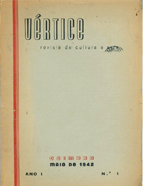

................................
With the end of the Second World War, Vértice embarked on a project of cultural renewal that aimed to contribute to the identification, study and transformation of the concrete problems of the country and its people. Hence, more than an art and culture journal, Vértice sought to establish itself as a journal of “useful culture”, in which theory should be combined with practice and study with action. It was with this aim in mind that intellectuals of a “progressive spirit” were invited to contribute to the pages of the journal. From the outset, there was an attempt to distance itself from other understandings of culture, namely a strictly bookish culture, and fr , an “office complacency”, a culture of abstraction and alienation from social problems (nos. 17-21, Nov. 1945, 69-71).
In one of the first editorials of the “new” Vértice, history was evoked in order to substantiate and legitimise this cultural project. It conveyed the image of a national past fractured by a fundamental contradiction between “progressive” and “obscurantist” Portugal. These two traditions were associated not only with certain figures in Portuguese history but also with different historical periods. The theory of decline outlined in the 19th century was readapted, according to which, after the golden age of the Discoveries, Portugal had entered a long period of obscurantism from the second half of the 16th century, only countered by the recovery in the ‘heroic phase of liberalism’. Still in the 19th century, a new cycle of “stagnation” had set in, which even the Republic had been unable to change (nos. 30-35, May 1946, 81-85).
Through a history of pedagogical and civic aims, Vértice took on the mission of recovering the progressive “glorious tradition”, as Piteira Santos reiterated a few years later: “we, who discovered our homeland in its historical and popular authenticity, have a duty to resurrect the noble and progressive traditions of the flock” (nos. 56-57, Apr. – May 1948, 372). As in the present at that time, the national past was presented as the result of a choice that had to be made between progress and obscurantism. On the centenary of 1848 in France, Borges de Macedo reflected precisely on the construction of historical memory, recognising that “it is in the atmosphere of a certain ‘present’ that a certain ‘past’ is chosen to commemorate” (nos. 56-57, Apr. – May 1948, 326-7). At a time when historical commemorations were used to celebrate the regime itself, a response to this hegemonic historical memory began to take shape in the opposition press. In the words of Borges de Macedo, “there is no single tradition, the past is not the same for everyone, just as the present is not”.
This work is financed by national funds through FCT - Foundation for Science and Technology, I.P, in the scope of the projects UIDB/04311/2020 and UIDP/04311/2020.
